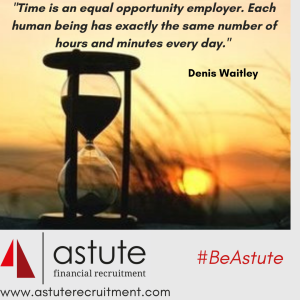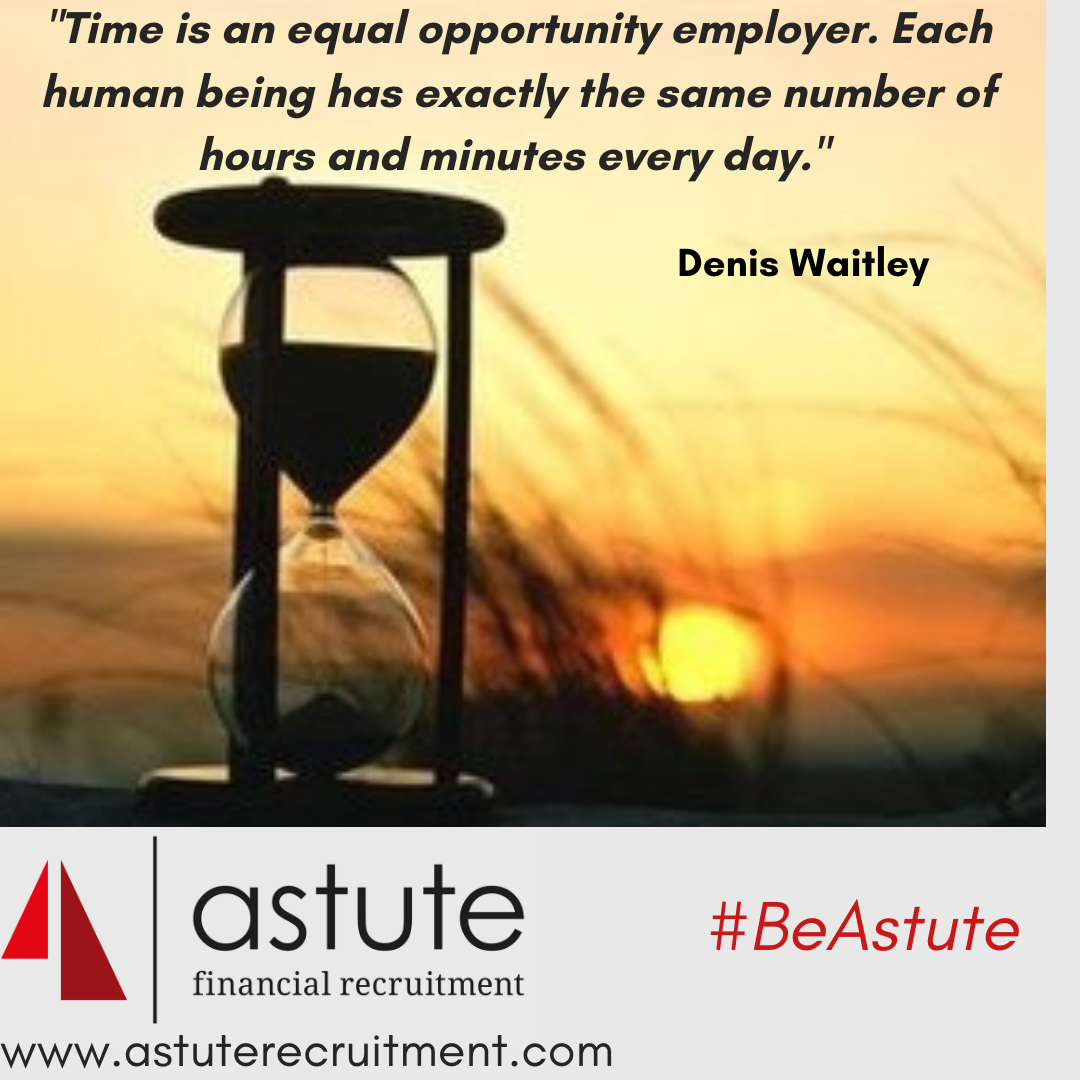 “Time is an equal opportunity employer. Each human being has exactly the same number of hours and minutes every day. Rich people can’t buy more hours. Scientists can’t invent new minutes. And you can’t save time to spend it on another day. Even so, time is amazingly fair and forgiving. No matter how much time you’ve wasted in the past, you still have an entire tomorrow.”
“Time is an equal opportunity employer. Each human being has exactly the same number of hours and minutes every day. Rich people can’t buy more hours. Scientists can’t invent new minutes. And you can’t save time to spend it on another day. Even so, time is amazingly fair and forgiving. No matter how much time you’ve wasted in the past, you still have an entire tomorrow.”
Denis Waitley
We hope you didn’t forget to pop your clocks forward an hour too!
But this set us thinking. How do you truly value your time? AND can this influence your levels of life satisfaction and levels of happiness.
The pandemic has carved up our usual lives, routines, working days and so, so much more. The enforced lockdowns reducing our world down to a microcosm within our homes.
Breaking normality.
Challenging our sanity.
Now, with renewed optimism, many cautiously turn their minds to regaining control of their lives, careers, and routines.
But, we cannot turn back the clock.
The last 12 months have left an indelible marker on our innermost thoughts and desires.
From many conversations, candidates from credit control to Finance Director, confirm their views on what really matters in their search for a new job has shifted.
The company car?
The snazzy office?
The potential promotion?
These don’t factor anywhere near as highly post pandemic. Instead, potential employees and job seekers value the currency of time above all else.
Work life balance, and genuine flexibility from a future employer are cited with increasing frequency as the most desirable attributes an employer can offer.
This is not to be confused with laziness or sloth. Infact, research has flagged again and again that increased employer engagement yields greater productivity.
So what can employers and business owners do?
Answer: Reaffirm your people value proposition and brand.
- Culture Counts
- Being valued matters
- Ethical Employers with a strong moral compass
Its as though the isolation of the last 12 months has made many people re-evaluate what is really important, and money, prestige, have fallen away to be replaced by more holistic values – especially time.
As businesses look to return to the office, it becomes even more key to ensure that protecting staff retention rates and top candidate attraction are front and centre of company strategy. This can be done by looking at the most valuable commodity to everyone of us at work and in life – the commodity of time.
Many of us value time differently because we each experience time in different ways. Some people believe they have enough time; others feel as though they’re being chased by the clock.
The question is, where are YOU on the spectrum? Time starved? An abundance of time at your disposal or somewhere in between?
It’s important that you consider this question because your experience of time dictates how you manage your day, your work, your life, even your finances.
We all have the same amount of time each day. So, what’s the difference between time deprivation and having an abundance of time?
The short answer: –
How you think about yourself in relation to time dictates how you value your time. Its also a precursor to happiness and contentment with life.
The Flow of Time
What makes the passage of time so challenging and individual in its passing, is that it’s both concrete and abstract at the same time. We watch the minutes on a clock face tick by on a very real clock. Even so, we measure time according to “zones.” And, depending on your circumstance, time can seem to move either fast or slow.
If you’re late for work, a red light can seem like hours, but if you’re scrolling through zillions of work emails, that same light can feel like it changed in a split second. The phrase “a watched kettle never boils” is so true. Time seems to slow right down when you are waiting for something to happen.
To complicate matters further, research tells us that people experience time differently based on their stage of development. Think of the repeated question every young child asks a parent on a car journey: “Are we nearly there yet?” For that child, a half-hour trip can seem like days. Some scientists state that conceptually, human beings live most of their lives by the time they reach 18 years old. This is because time seems to pass more slowly to a child than to an adult. As we age, the years appear to pass faster and faster. When in actuality – time of course has not sped up at all. Our concept of the passage of time has merely shifted.
Lets look at some interesting points around ‘Time Poor’ vs ‘Time Rich’
Here’s What Time Rich Looks Like: –
For the people who live in scarcity of time, the distinctions are fairly obvious. They always feel as though they’re being chased by time. There’s never enough time to do the things they want to do; they are frustrated and overwhelmed. Often at work, they will be creating extra anxiety over their perceived lack of time to get work tasks completed.
If you score highly as being time rich, there are subtle differences to those who are time-poor.
From an assessment by The Money Meter, their results suggested two groups of individuals in the time-rich category. Let’s talk about these two groups as the Blue and Green Groups.
The Blue Zone: Moderately Time Rich
People who are scoring in the moderate zone of time abundance, state that they experience less anxiety, stress, and fewer negative emotions about time than those who are time-poor because they view time as neutral.
Yes, time is transitory, fleeting, a precious commodity, and it should therefore be managed well. However, this group experiences time as a continuum that marks the passing of events.
People in the Blue Group appreciate flexibility and having control over their own time. They are deliberate and intentional in creating time for family and relaxation, and they pride themselves on how well they “manage” their daily timetable & work schedules.
Precisely because they appreciate, rather than fear, the fleeting sense of time, the people in the Blue Group are often more energised and focused. They tend to experience a greater sense of accomplishment at the end of each working day.
Whilst keen on making time for family and loved ones, they are more focused on time from a task orientation perspective than they are from a relational one. Time with family, for example, may only happen when their ‘work’ is completed.
No room for sentiment – thats just what has to happen for them.
Responsibility and control are key elements for how people in the Blue Zone value time. For people in this group. their realisation is that “Time is fleeting. I should manage it well!”
In short, they firmly believe they have control over their time.
They take pride in themselves in their ability to prioritise work/ jobs, and they enjoy a sense of accomplishment at the end of each day.
Then we have the Green Group representing those who are highly time rich.
People who score as ‘highly time rich’, seem to believe that they have enough time to accomplish whatever they want, whenever they want. They view time as precious and go beyond “managing it” to using it astutely.
Wise use of time means that they live from a sense of joy, appreciation, and freedom. They are present in the moment and therefore better able to respond to changing timetables or altered meeting times in more spontaneous ways.
Because of this high level of flexibility, the Green crowd lives a more balanced life. Family activities are not tasks to check off a list. Family is first—not an interruption.
For people in this category, there is always time to do the “important things” in life.
Perhaps the biggest differentiator between these two groups is that the green group has a deep desire to make every moment count. They value time in terms of relationships over task orientation. Making memories is important; they don’t want to be known as workaholics or taskmasters.
Major Theme: Time is precious. I should use every moment wisely.
Research has been inconclusive to tell if this highly time-rich perspective on time occurs with age and the passing of time or after a life-threatening loss or illness.
Either way, it’s a perspective worth considering in a world held hostage by the increasing demands of work, social media, mobile phones, and the expectation of being available at a moment’s notice.
As a call to action, examine your perspective on time.
Every one of us, every single moment of every single day, experiences huge pulls on our time. Our daily demands are great. It can be hard to set firm boundaries between work, family, and very importantly yourself.
Time for you!
What this research and many other investigations flag, is that those who value time and appreciate its transience, are the ones most likely to achieve a happier, more satisfying work/ life balance.
Now that’s something we could all do with!
Mary Maguire
Managing Director
Astute | Accountancy & Finance | HR | Office Support
Suite One, Ground Floor West, Cardinal Square, 10 Nottingham Road, Derby, DE1 3QT
T: 01332 346100
M: 07717 412911
LI: https://uk.linkedin.com/pub/mary-maguire/18/73/553
LI: www.linkedin.com/company/astute-recruitment/











